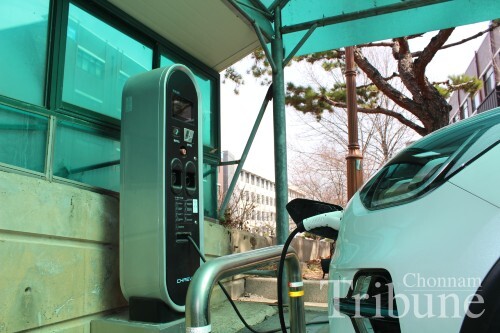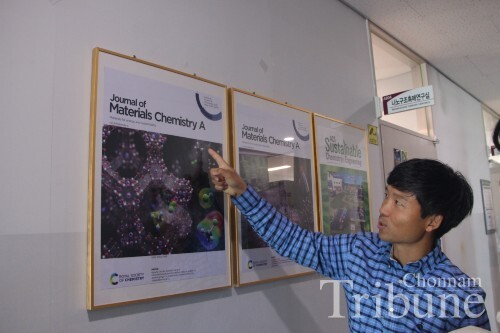
Forest fires are raging in Australia, cities are flooded in China, and hurricanes tear through cities in Central America. As the climate continues to change for the worse, the destruction it brings only grows stronger. Human activities such as burning fossil fuels can intensify natural phenomena, causing frequent climate-related disasters that spread to wider areas of the globe. We need not look any further than Gwangju to see the truth in this; the city has recently been experiencing the worst drought in 50 years, resulting in a severe water shortage among its citizens. It is clear that something must be done.
In 2015, the UN announced the Sustainable Development Goals (SDGs) as part of its Post-2015 Development Agenda. The SDGs are a collection of objectives created to serve as a "shared blueprint for peace and prosperity for people and the planet now and into the future." Within these goals, quality education and climate action are key elements in creating an inclusive, sustainable planet. This may bode the question, "Where do universities come into all of this?" Universities are increasingly recognizing their responsibility as academic leaders to actively contribute to the carbon-neutrality movement and make a positive impact on the climate. At the 2021 Times Higher Education Climate Impact Forum, 1,050 universities across 68 countries vowed to make a difference to reach net-zero emissions by 2050, including Chonnam National University (CNU).
Making a Zero-Carbon Campus
The most fundamental yet definite way for universities to help achieve net-zero emissions is to build environmentally friendly infrastructure on campus. To power an institution as big as a university, a significant amount of energy needs to be generated. To make less of an impact on the environment, universities must find ways to cut down on fossil fuels. Furthermore, they are expected to take the role of forerunners in technological advancement, especially when it comes to reducing their carbon footprint. CNU is moving towards the goal of carbon neutrality, emphasizing the importance of creating an eco-friendly campus in their 2022-2025 development plans.
One way the university is making an effort to minimize carbon emissions is through the installation of solar panels. All new buildings on campus are required to install solar panels on their roofs. Mounted on the rooftops of most buildings on campus, solar panels collect renewable, pollution-free solar energy. Not only is solar energy a building block for a clean energy future, but it also helps us cut down on electricity usage. According to the Department of Facilities Management, the solar panels on campus buildings generated 1837.904 MWh worth of electricity last year alone.
In addition, CNU has several electric vehicle charging stations in parking lots located across campus to help electric vehicle owners while promoting sustainability at the university. In the summer of 2022, Nephrons, which are waste recycling robots developed by the startup company Superbin, were also installed at the East Entrance and in front of the Residence Hall 9C. They use artificial intelligence to take plastic bottles and aluminum cans and give back points that can stored in an application and later be turned into cash. Kang Ji-min (Sophomore, Faculty of Business Administration), who uses the robots regularly, said, “Living on campus creates a lot of plastic waste, despite my efforts to reduce litter. It’s really nice that you can earn money while recycling. I encourage my fellow dorm students to use Nephron.”

Educating Future Experts
The main purpose of a university is to provide an appropriate education in various fields for its students. University-educated people can make a difference in our community as engineers, policymakers, corporate managers, and educators. This is why what is being taught to students is so important. A sustainable university should aim to incorporate environmental practices in its curriculum and train students in areas that could either impact or be impacted by climate change.
In July 2022, CNU was chosen to be part of the Greenhouse Gas Reduction Innovation Student Education Project in a consortium with Jeonbuk National University. The project, supported by the Ministry of Education and the Ministry of Trade, Industry, and Energy, aims to foster technical and engineering experts in such fields as innovative technologies and policies related to greenhouse gas reduction, and carbon capture, utilization and storage. Participating students received first-hand training, including a research excursion to Mudeungsan on September 23 and a trip to the Korea Mine Rehabilitation and Mineral Resources Corporation on November 25. From this year, two universities will establish an educational, industry-academic, and overseas university cooperation system to conduct innovative greenhouse gas reduction education and research for undergraduates, excluding freshmen, and graduates in the Department of Energy and Resource Engineering.
CNU also offers students opportunities to pursue practical and hands-on learning experiences in agriculture to fight climate change. The Department of Applied Biology currently runs a project supported by Brain Korea 21, which is one of the largest government-led research grant programs, initiated to support Korean higher education and research institutions to foster future generations in academia. The project of the Climate Change Combat Crop Protection Future Expert Education Research aims to understand agriculture from an environmental standpoint and research ways to protect and adapt species in the ongoing climate crisis. The program has held various seminars, guest lectures, symposiums, and field trips to farms impacted by climate change. In the following years, they intend to strengthen fieldwork, overseas training, and research support.

Conducting Environmental Research
Research, vital to any civilized society, is what fuels advancements in various fields of study, such as health, economics, science, technology, engineering, mathematics and energy. As major providers of academic growth, universities represent some of the most concentrated communities of scholars. They are well-provided with appropriate facilities, so engaging in research is a big part of their missions around learning and discovery. Teaching may seem the most obvious when it comes to the purpose of universities. However, the devotion to academic breakthroughs is what really sets them apart from other educational institutions.
CNU's research on greenhouse gas reduction is especially prominent. Na Kyung-su (Professor, Dept. of Chemistry) and his team celebrated academic recognition with two research projects in late 2022. They succeeded in direct hydrogenative conversion of CO₂ to liquid hydrocarbons and selective methane chlorination to methyl chloride. Both studies regarding the projects made it into The Journal of Materials Chemistry A, a weekly peer-reviewed scientific journal made by the UK's Royal Society of Chemistry. “My research is still rather carbon-positive, unfortunately. However, it could be the start of a discovery that could lead us to carbon neutrality. The world cannot be changed at once. This is why the study of basic science can carry on,” said Professor Na.
It is not only professionals that are making a difference in environmental experimentation. There is a vehicle engineering student club “AUTO” for car enthusiasts in the School of Mechanical Engineering. AUTO President Kim Jun-su (Senior, School of Mechanical Engineering) said, “As the societal demand for sustainable cars rises, we have shifted our interest from vehicle design competitions using internal combustion engine vehicles that burn fossil fuels to vehicles that run on electric energy.” The club members design, engineer, build, test, and compete with vehicles created through 3D modeling with computers.
Taking the Next Step Towards Net-Zero
Climate change is now an undeniable global problem that impacts every aspect of our lives, from the food we eat to the air we breathe. As the necessity to combat the climate crisis grows stronger, carbon-neutral universities become increasingly more in need. Universities are at the core of research and education to make our planet more sustainable. While also benefiting from funds and scholars, they are also responsible for using their resources to identify current problems and take the action needed to solve them. By implementing green initiatives, educating students, and conducting research, universities can lead the way in reducing carbon emissions and promoting a more environmentally friendly future.
However, it is essential to note that the issue of climate change requires collective action. Universities must not only act within their campuses but also encourage their students to adopt sustainable practices in their daily lives. They can inspire and motivate their students, faculty and staff members, and the community to take actions to contribute to sustainability. There is a need for continued efforts to raise awareness and promote sustainable practices to achieve carbon neutrality. If higher education institutions continue to seek sustainability, a world of carbon neutrality is not far from our reach.
By Lee Younny, Editor

